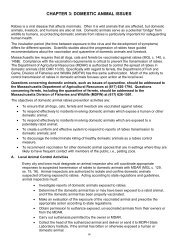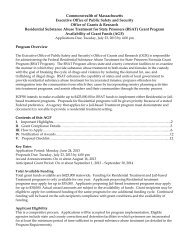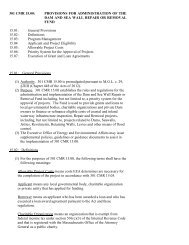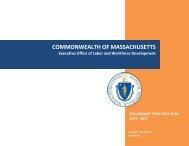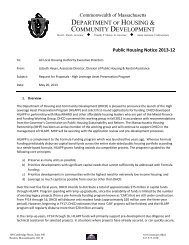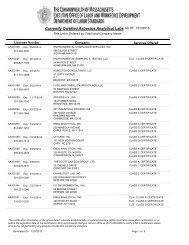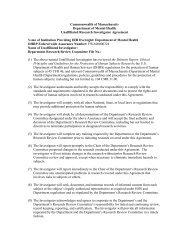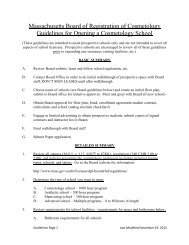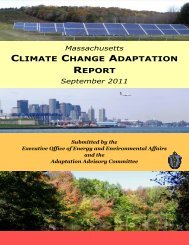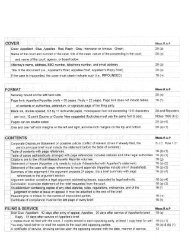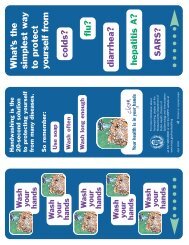MCAD and AWEKE KIFLE, Complainants v - Mass.Gov
MCAD and AWEKE KIFLE, Complainants v - Mass.Gov
MCAD and AWEKE KIFLE, Complainants v - Mass.Gov
You also want an ePaper? Increase the reach of your titles
YUMPU automatically turns print PDFs into web optimized ePapers that Google loves.
_______________________<br />
<strong>MCAD</strong> <strong>and</strong> <strong>AWEKE</strong> <strong>KIFLE</strong>,<br />
<strong>Complainants</strong><br />
THE COMMONWEALTH OF MASSACHUSETTS<br />
COMMISSION AGAINST DISCRIMINATION<br />
v. DOCKET NO. 96-BEM-2775<br />
KINNEY SYSTEMS, INC.,<br />
Respondent<br />
_______________________<br />
Appearances:<br />
Valeriano Diviacchi, Esquire for the Complainant<br />
Mark H. Burak, Esquire <strong>and</strong> Stacey L. DiJon for the<br />
Respondent<br />
DECISION OF THE HEARING OFFICER<br />
I. PROCEDURAL HISTORY<br />
On or about October 17, 1996, Aweke Kifle filed a<br />
complaint with this Commission charging Kinney Systems,<br />
Inc. with discrimination on the basis of race, color, <strong>and</strong><br />
national origin, in violation of M.G.L. c.151B.<br />
Complainant later amended the complaint to include a charge<br />
of unlawful retaliation. The Investigating Commissioner<br />
issued a lack of probable cause finding <strong>and</strong> after appeal,<br />
reversed the lack of probable cause finding on the claim of<br />
retaliation only. Attempts to conciliate the matter<br />
failed, <strong>and</strong> following a certification conference, a<br />
complaint <strong>and</strong> order for certification was issued. A public<br />
hearing was held before me on February 11 <strong>and</strong> 12, 2003.
After carefully considering the evidence of record <strong>and</strong> the<br />
post-hearing submissions of the parties, I make the<br />
following findings of fact, conclusions of law <strong>and</strong> order.<br />
II. FINDINGS OF FACT<br />
1. Respondent Kinney Systems, now known as Central<br />
Parking Systems of <strong>Mass</strong>achusetts, operates garage <strong>and</strong><br />
commuter parking lots throughout <strong>Mass</strong>achusetts.<br />
2. Complainant Aweke Kifle resides in the Dorchester<br />
neighborhood of Boston. Complainant is a native of<br />
Ethiopia who immigrated to the United States in 1991.<br />
3. In May 1993, Complainant began working for<br />
Respondent as a cashier. In approximately September 1993,<br />
Complainant was promoted to Assistant Manager at<br />
Respondent’s John Hancock Garage. As Assistant Manager,<br />
Complainant’s duties included filing daily reports, taking<br />
care of monthly tenants <strong>and</strong> supervising cashiers at various<br />
locations. In 1995, Respondent lost the management<br />
contract for the Hancock Garage, <strong>and</strong> Complainant was<br />
transferred to a facility at the MBTA’s Quincy Adams<br />
Station, where he worked in the same capacity, until early<br />
2
1996 when he was transferred to the <strong>Gov</strong>ernment Center<br />
Garage.<br />
4. Complainant’s supervisor at the <strong>Gov</strong>ernment Center<br />
Garage was Michael Medeiros who had transferred from a<br />
Rhode Isl<strong>and</strong> facility in July 1996.<br />
5. While working at the <strong>Gov</strong>ernment Center Garage, in<br />
1996, Complainant filed an <strong>MCAD</strong> complaint charging<br />
Respondent with discrimination on the basis of race, color<br />
<strong>and</strong> national origin. He alleged that a white co-worker was<br />
paid a higher salary than he was paid for doing the same<br />
job.<br />
6. Complainant alleged that in October or November<br />
1996, shortly after filing his <strong>MCAD</strong> complaint, Respondent’s<br />
regional manager, Solomon Lemma, approached him at the<br />
<strong>Gov</strong>ernment Center garage, entered the office, closed the<br />
door <strong>and</strong> asked Complainant why he had filed the complaint.<br />
7. According to Complainant, Lemma told him that he<br />
planned to give him a raise <strong>and</strong> promotion <strong>and</strong> wondered why<br />
Complainant had rushed to file a complaint. Complainant<br />
claimed that Lemma told him that the reality was that<br />
3
Respondent paid blacks lower wages than whites. I do not<br />
credit this testimony.<br />
8. According to Complainant, Lemma told him that his<br />
complaint would destroy the whole company if it were to<br />
proceed because many others would file complaints.<br />
Complainant told Lemma that he would not drop his<br />
complaint.<br />
9. Complainant testified that Lemma came to him<br />
several more times that same week, urging him to drop his<br />
<strong>MCAD</strong> complaint. According to Complainant, Lemma told him<br />
that Respondent was very serious, <strong>and</strong> that he would be hurt<br />
or killed if he did not drop his complaint. I do not<br />
credit this testimony. I find it incredible that<br />
Complainant’s life <strong>and</strong> physical safety were threatened<br />
because he filed an <strong>MCAD</strong> complaint.<br />
10. Complainant alleged that a week later, Mark<br />
Furman, then Respondent’s Regional Vice President, arrived<br />
at the <strong>Gov</strong>ernment Center Garage <strong>and</strong> told Complainant that<br />
if he dropped the complaint he would receive a raise <strong>and</strong><br />
promotion, but that if he did not drop the complaint, there<br />
would be serious consequences. Furman denied making these<br />
4
statements. I do not credit Complainant’s testimony in this<br />
regard. Instead I credit Furman’s testimony, which I found<br />
to be believable.<br />
11. Complainant testified that a week or two after his<br />
discussion with Furman, he met with Mike Medeiros, the new<br />
manager of the <strong>Gov</strong>ernment Center Garage. He testified that<br />
Medeiros told him he would give him a promotion <strong>and</strong> a<br />
transfer to a new location if he dropped the case.<br />
Complainant again refused to drop the case. I do not<br />
credit this testimony.<br />
12. In March 1997, Complainant received a written<br />
reprim<strong>and</strong> from Mark Furman advising Complainant that he was<br />
seen with his feet up on the desk at the <strong>Gov</strong>ernment Center<br />
Garage while on duty in plain view of customers.<br />
Complainant stated that it was impossible for him to put<br />
his feet up on the desk. I do not credit his testimony.<br />
There was testimony that Complainant <strong>and</strong> others could put<br />
their feet on the desk, <strong>and</strong> there was credible testimony<br />
that Complainant often sat with his feet on the desk.<br />
Further, there was credible testimony that Furman routinely<br />
sent similar memos to other employees. This written<br />
5
memor<strong>and</strong>um did not contain a threat of discipline, nor did<br />
it result in any change in Complainant’s employment.<br />
13. In June 1999, Complainant was transferred to<br />
Respondent’s MBTA Alewife facility. He testified that<br />
while at Alewife, various managers told him that Lemma <strong>and</strong><br />
the company were “after him” <strong>and</strong> wanted to fire him. I do<br />
not credit this testimony.<br />
14. In late 1998 or 1999, Solomon Lemma took over as<br />
manager of Alewife. Complainant alleged that for an eight-<br />
month period while working at Alewife, Lemma required him<br />
to perform weekend duties beyond his assigned tasks <strong>and</strong><br />
further required him to punch out at 4:00 p.m. on Saturdays<br />
while requiring him to work until midnight without pay. I<br />
do not credit this testimony. Complainant never complained<br />
about this treatment to anyone at Respondent.<br />
15. Complainant further testified that Lemma called<br />
him every Saturday at 4:00 p.m. to ensure that Complainant<br />
had punched out for the day. Lemma testified credibly that<br />
he never told Complainant to continue working without pay<br />
after punching out. Further Complainant produced no<br />
6
corroborating evidence that he did, in fact, punch out<br />
while continuing to work without pay.<br />
16. In July 1999, Kinney Systems was purchased by<br />
Central Parking which caused a change in supervisors at the<br />
Alewife facility. Abdi Warsame became the general manager<br />
of Alewife <strong>and</strong> his brother Mohamed Warsame became regional<br />
manager.<br />
17. Complainant testified that shortly after the<br />
takeover, Mohamed Warsame cam to him <strong>and</strong> said that Lemma<br />
had told him all about Complainant. Complainant testified<br />
that he asked Mohamed Warsame to give him a promotion <strong>and</strong><br />
raise, but that Warsame responded that he would not receive<br />
a promotion <strong>and</strong> raise because of his claim against the<br />
company. I do not credit this testimony.<br />
18. Complainant was transferred to Mystic Center, in<br />
Medford, where he continued to work as an Assistant Manager<br />
at the time of the public hearing.<br />
19. Solomon Lemma was the Operational Manager for<br />
Respondent until leaving the company in 1999. Lemma<br />
testified in around the fall of 1996, Mark Furman told him<br />
7
that Complainant had filed a discrimination complaint<br />
against Respondent. Lemma agreed to discuss the charge<br />
with Complainant.<br />
20. Lemma, who is also Ethiopian, explained to<br />
Complainant that the disparity in pay between him <strong>and</strong> a<br />
Caucasian co-worker was not because of discrimination.<br />
Lemma denied pressuring Complainant to drop his complaint,<br />
but explained to Complainant that as a countryman, he would<br />
be the first to tell him if discrimination existed. Lemma<br />
testified that Complainant was adamant about pursuing his<br />
complaint, <strong>and</strong> Lemma let the matter drop. Lemma denied<br />
offering Complainant a raise or promotion in exchange for<br />
dropping his complaint. I credit Lemma’s testimony.<br />
22. Karen Poliseno has been employed by Respondent as<br />
a Human Resources Manager since January 2001. Poliseno<br />
testified that in 2002, Complainant was present at<br />
Respondent’s Human Resources Office <strong>and</strong> inquired about<br />
management positions. Poliseno told Complainant to provide<br />
her with a copy of his resume. However, Complainant never<br />
followed up. I credit this testimony.<br />
8
23. Michael Medeiros supervised Complainant while<br />
managing the <strong>Gov</strong>ernment Center Garage. Medeiros testified<br />
that after having been the manager at <strong>Gov</strong>ernment Center for<br />
three months, he drafted written evaluations of his three<br />
assistant managers, including Complainant. The written<br />
evaluation of Complainant did not constitute a formal<br />
review, was not shown to Complainant <strong>and</strong> did not result in<br />
any disciplinary action against Complainant.<br />
25. In the November 14, 1996 memor<strong>and</strong>um, Medeiros<br />
wrote, in part, “Mr. Kifle lacks the innate motivation<br />
necessary to work at this facility… In closing I feel it is<br />
inappropriate to expect a facility as busy as <strong>Gov</strong>ernment<br />
Center to have Aweke Kifle be a member of its management<br />
team.” Medeiros testified that he had no knowledge of<br />
Complainant’s <strong>MCAD</strong> complaint until he was subpoenaed to<br />
appear at the public hearing in this matter <strong>and</strong> therefore<br />
could not have written this negative evaluation in<br />
retaliation. I credit this testimony.<br />
26. Mohamed Warsame is currently employed by Central<br />
Parking as Operational Manager. He started as a cashier<br />
for Allright Parking in 1983, <strong>and</strong> became an operational<br />
manager when Allright merged with Central Parking in 1998.<br />
9
Warsame worked with Complainant in 1999 at the Alewife<br />
Station.<br />
27. Warsame testified that Complainant did not hide<br />
his feelings <strong>and</strong> told him that Lemma discriminated against<br />
him by paying white employees more than black employees.<br />
Warsame did not respond to such statements. He denied<br />
telling Complainant that he would never receive a raise or<br />
a promotion unless he dropped his lawsuit. I credit his<br />
testimony.<br />
28. Warsame testified that in December 1999 when<br />
Respondent needed to hire a manager for the Orange Line, he<br />
promoted Abdul Kadir. According to Warsame, Complainant<br />
never before expressed an interest in a promotion, then<br />
told Warsame he was interested in a promotion.<br />
29. Following this discussion, in April 2000, a job<br />
opened up on the Red Line. Warsame discussed the job with<br />
Complainant who appeared to be very interested in the job.<br />
Warsame recommended Complainant for the position. After<br />
receiving the offer, Complainant told Warsame that the job<br />
entailed too many hours. I credit this testimony.<br />
10
26. Susan Hawes, formerly a human resources manager<br />
for Respondent, testified that on the recommendation of<br />
Mohamed Warsame, she prepared an offer letter to<br />
Complainant, dated April 26, 2000, for the position of<br />
Manager of the Red Line. After learning that Complainant<br />
had not received the letter, Hawes had a telephone<br />
conversation with Complainant concerning the job offer.<br />
Complainant told Hawes that he needed to think about the<br />
offer <strong>and</strong> would get back to her, but did not do so. I<br />
credit her testimony. I do not credit Complainant’s<br />
testimony that he did not receive the job offer until after<br />
it had expired <strong>and</strong> never spoke with Hawes about the job.<br />
33. Mark Furman was the Regional Vice President of<br />
Kinney Systems from 1994 to 1997. Furman testified that<br />
although he often spoke to Complainant at the <strong>Gov</strong>ernment<br />
Center Garage, he did not recall ever speaking directly to<br />
Complainant about his charge of discrimination.<br />
35. Furman testified that he recalled reviewing the<br />
employment of all the managers at <strong>Gov</strong>ernment Center with<br />
Michael Medeiros, but took no action as a result of the<br />
evaluation because it was merely an informal evaluation<br />
that was not shown to the employees. Furman denied ever<br />
11
telling Complainant that he would be given a raise <strong>and</strong><br />
promotion in exchange for dropping his complaint.<br />
36. Complainant received a raise of nearly 10% within<br />
two months of filing his <strong>MCAD</strong> complaint <strong>and</strong> has continued<br />
to receive regular raises.<br />
III. CONCLUSIONS OF LAW<br />
M.G.L. c. 151B, section 4(4a) makes it unlawful to<br />
retaliate against an employee for exercising his rights under<br />
this chapter. Complainant charges that Respondent unlawfully<br />
retaliated against Complainant for having filed a complaint<br />
of discrimination with this Commission. In order to establish<br />
a prima facie case of retaliation, Complainant must show that<br />
he engaged in a protected activity, that Respondent was aware<br />
of that activity, <strong>and</strong> that he was subsequently subjected to<br />
an adverse employment action <strong>and</strong>, absent other evidence<br />
establishing retaliatory intent, the adverse action followed<br />
the protected activity within such time that retaliatory<br />
intent can be inferred. Cimino v. BUT Electronics, 18 MDLR<br />
197 (1996). I conclude that Complainant has failed to<br />
establish a prima facie case of unlawful retaliation.<br />
Complainant engaged in a protected activity when he filed a<br />
discrimination complaint against Respondent in 1996.<br />
12
Further, Complainant’s managers were made aware of his<br />
complaint <strong>and</strong> asked Complainant’s immediate supervisor to<br />
discuss the matter with him. Thereafter, Complainant was<br />
written up for putting his feet up on a desk, <strong>and</strong> his<br />
supervisor wrote a negative memor<strong>and</strong>um to the regional<br />
director concerning Complainant’s work performance. However,<br />
Complainant was not disciplined in any way following these<br />
events, nor was he threatened with any disciplinary action<br />
<strong>and</strong> did not suffer any tangible adverse employment action.<br />
Therefore I conclude that Complainant has not<br />
established that he was subjected to any adverse action.<br />
See, MacCormack v. Boston Edison, 423 <strong>Mass</strong>. 652, 663-<br />
664(1996). I did not credit Complainant’s allegations that<br />
he was continually urged to drop his complaint, or that his<br />
life was threatened for filing his complaint. Complainant<br />
continues to work for Respondent to this day, has received<br />
regular raises <strong>and</strong> has turned down at least one promotion. I<br />
do not believe he would have remained on the job for the past<br />
seven years, had he been treated as badly as he claims.<br />
Therefore, I conclude that Respondent did not engage<br />
in unlawful retaliation in violation of M.G.L. c. 151B <strong>and</strong><br />
conclude that the complaint in this matter be dismissed.<br />
13
dismissed.<br />
IV. ORDER<br />
For the reasons stated above, this matter is hereby<br />
This constitutes the final decision of the hearing<br />
officer. Any party aggrieved by this order may file a<br />
Notice of Appeal within ten days of receipt of this order<br />
<strong>and</strong> a Petition for Review within 30 days of receipt of this<br />
order.<br />
SO ORDERED, this 17th day of July, 2003.<br />
____________________<br />
JUDITH E. KAPLAN<br />
Hearing Officer<br />
14



